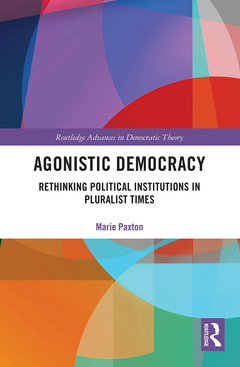Agonistic Democracy Rethinking Political Institutions in Pluralist Times Routledge Advances in Democratic Theory Series
Auteur : Paxton Marie

Agonistic Democracy explores how theoretical concepts from agonistic democracy can inform institutional design in order to mediate conflict in multicultural, pluralist societies.
Drawing on the work of Foucault, Nietzsche, Schmitt and Arendt, Marie Paxton outlines the importance of their themes of public contestation, contingency and necessary interdependency for contemporary agonistic thinkers. Paxton then delineates three distinct approaches to agonistic democracy: David Owen?s perfectionist agonism, Mouffe?s adversarial agonism and William Connolly and James Tully?s inclusive agonism. She demonstrates how each is fundamental to enabling citizens to cultivate better virtues for themselves and society (Owen), motivating democratic engagement (Mouffe) and enhancing relations of respect and understanding between conflicting citizens (Connolly and Tully). Situated within the context of a deeply polarised post-Trump America and post-Brexit Britain, this book reveals the need to rethink our approach to conflict mediation through democratic institutions. Pulling together insights from experimental research with deliberative democratic innovations, Paxton explores how agonistic theory might be institutionalised further.
By discussing ways in which agonistic institutions might be developed to render democracy more virtuous, more engaging, and more inclusive, this book provides a unique resource for students of contemporary political theory.
Acknowledgements. Introduction: Why Agonistic Democracy? Part 1: Theory 1. The Theoretical Roots of Agonistic Democracy 2. Three Approaches to Agonistic Democracy 3. Agonistic Democracy and Institutions Part 2: Institutions 4. Experimenting with Agonistic Democracy 5. Insights from Agonistic Experimentation 6. Agonistic Democracy and Democratic Innovations 7. Proposals for Agonistic Institutions Index.
Marie Paxton Staniforth is an Assistant Professor of Political Science at Westminster College, Salt Lake City.
Date de parution : 12-2021
15.2x22.9 cm
Date de parution : 11-2019
15.2x22.9 cm
Thème d’Agonistic Democracy :
Mots-clés :
Agonistic Democracy; UK Conservative Party; UK Labour Party; Agonistic Institutions; Leaves Minority Groups; Audi Alteram Partem; Public Engagement; Agonistic Democrats; Direct Democracy; Agonistic Day; Inclusive Contestation; Agonistic Concepts; Agonistic Ethos; Agonistic Principles; Agonistic Respect; Deliberative Democrats; Agonistic Theory; Enlarged Mentality; Agonistic Behaviours; Agonistic Approach; Dominant Status Quo; Participatory Budgeting; Perfectionist Contestation; Contestation Day; PB Process; Adversarialism; Agonism; Agonistic Politics; Bruce Ackerman; Carl Schmitt; Chantal Mouffe; Communitarianism; Contemporary Political Thought; David Owen; Deliberation Day; Deliberative Democracy; Democracy; Democratic Politics; Democratic Theory; Friedrich Nietzsche; Group Rights; Hannah Arendt; Inclusivism; James Fishkin; James Tully; Liberal Democracy; Marie Paxton; Michel Foucault; Minority Rights; Perfectionism; Political Theory; William Connolly; political institutions; pluralist societies



